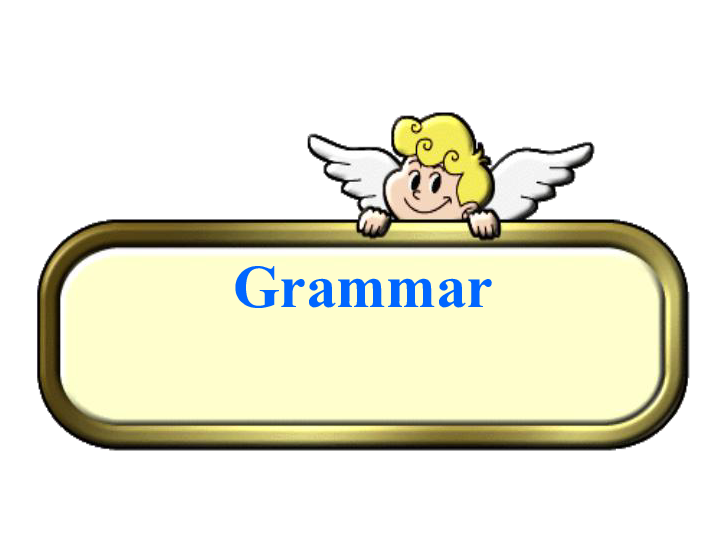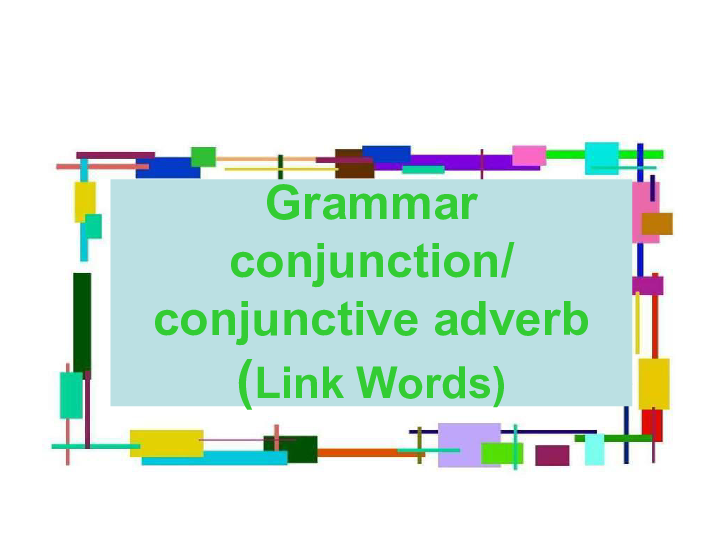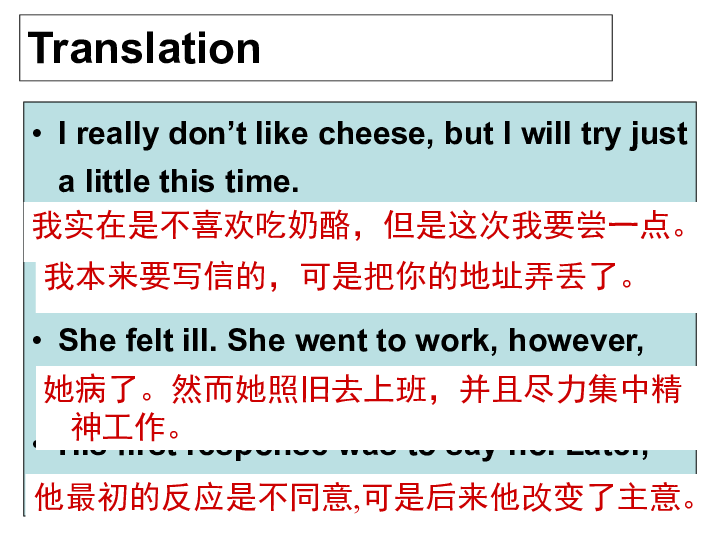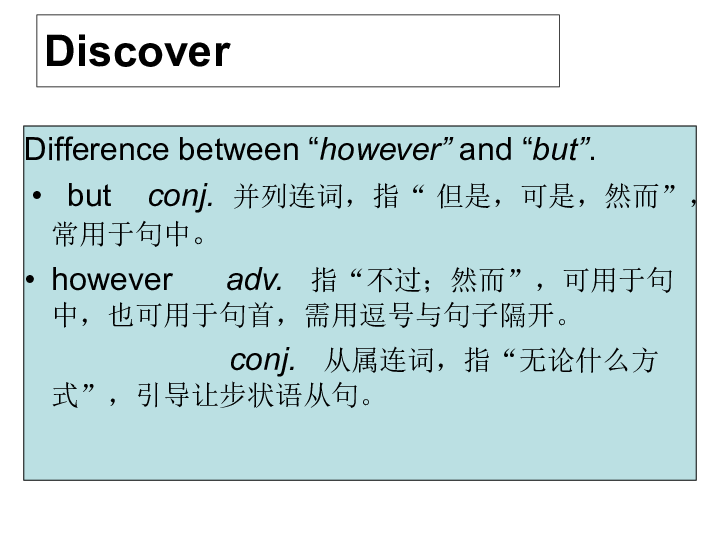英语高中外研版必修五Module1《British and American English》课件4
文档属性
| 名称 | 英语高中外研版必修五Module1《British and American English》课件4 |  | |
| 格式 | zip | ||
| 文件大小 | 113.1KB | ||
| 资源类型 | 教案 | ||
| 版本资源 | 外研版 | ||
| 科目 | 英语 | ||
| 更新时间 | 2013-03-23 11:42:23 | ||
图片预览





文档简介
课件18张PPT。Grammar Grammar
conjunction/
conjunctive adverb
(Link Words)TranslationI really don’t like cheese, but I will try just a little this time.
I was going to write, but I lost your address.
She felt ill. She went to work, however, and tried to concentrate.
His first response was to say no. Later, however, he changed his mind. 我实在是不喜欢吃奶酪,但是这次我要尝一点。我本来要写信的,可是把你的地址弄丢了。她病了。然而她照旧去上班,并且尽力集中精神工作。他最初的反应是不同意,可是后来他改变了主意。DiscoverDifference between “however” and “but”.
but conj. 并列连词,指“ 但是,可是,然而”,常用于句中。
however adv. 指“不过;然而”,可用于句中,也可用于句首,需用逗号与句子隔开。
conj. 从属连词,指“无论什么方式”,引导让步状语从句。 Look at the sentences and answer the questions.The report shows that we are making progress but that we need to make greater efforts
In the last ten years in China, 150 million people moved out of poverty. However, the challenges are still great.
More than 1 billion people in developing countries do not drink safe water. However, in other parts of the world, e.g. Eastern Europe, water is now mostly safe to drink.Yes.1. Does however mean the same as but?However.2. Which link word begins a sentence?But 3. Which link word can join two parts of a sentence?However.4. Which link word is followed by a comma?Check your answers.Link these sentences with but or however.Check your answers.In a developed country, people have nice clothes to wear, but in a poor country people have few clothes.
In a developed country, most people have a home. However, in a poor country a much larger percentage of the population is homeless.3. In a developed country, one can get good medical care, but in a poor country there is no money for medical care.
4. In a developed country, people have small families. However, in a poor country the families are larger.TranslationAlthough it was so cold, he went out without an overcoat.
Although they are poor they are happy.
Norway is at the top of the list, while the United States is at number 7.
She likes coffee while I like tea. 天气虽然很冷, 他没有穿大衣就出去了。虽然他们很穷,但很快乐。挪威位于名单的首位,而美国位于第七。他喜欢喝咖啡,而我却喜欢喝茶 。DiscoverDifference between “although” and “while”.
although conj. 从属连词, 可引导让步状语从句,常用于句首,指“尽管, 虽然”。不可与but连用,但可与yet, still连用。
while conj. 并列连词,指“然而”,常用于句中,表示对比。Look at the sentences and answer the questions.1. Norway is at the top of the list, while the United States is at number 7.
2. The UK is in the thirteenth position, while China is in the middle of the list.
3. Although more than 80% of children in developing countries go to primary school, about 115 million children are not being educated.
4. Although developed countries give some financial help, they need to give much more.Which sentences compare two facts?
Which sentences can you rewrite using the word but?All of them.All of them.Check your answers.Join the sentences using the words in brackets.1. Although developed countries are rich, they don’t give enough financial help to developing countries.
2. Europe has a lot of industry, while Africa does not have much.
3. In some parts of Europe, incomes are high, while in other parts they are much lower.
Check your answers.4. Although there is poverty in this area, people are happier than in the city.
5. Some children receive a good education, while others never go to school at all.
6. Although life expectancy is still low, it has improved in the last ten years.
Translation他个子矮而他兄弟个子高。
他很努力,然而还是失败了。
他遇到了很多麻烦,但是他没有抱怨。He is short, while his brother is tall.He worked hard. However, he failed.He has got so many troubles, but he did not complain.1. She has her weakness, ____ that doesn’t mean she is not fit for the job.
A. but B. however C. and D. while
2. I like to play outside _____ my brother likes to stay at home.
A. however B. when C. as D. whilePractice 3. _____ he had to write a history paper, ____ he couldn’t find time to do it.
A. Although; but B. Although; /
C. Even though; / D. Even if; /
4. I do every single bit of housework____ my husband Bob just does the dishes now and then.
A. since B. when
C. while D. as
I was going to write, but I lost your address.
She felt ill. She went to work, however, and tried to concentrate.
His first response was to say no. Later, however, he changed his mind. 我实在是不喜欢吃奶酪,但是这次我要尝一点。我本来要写信的,可是把你的地址弄丢了。她病了。然而她照旧去上班,并且尽力集中精神工作。他最初的反应是不同意,可是后来他改变了主意。DiscoverDifference between “however” and “but”.
but conj. 并列连词,指“ 但是,可是,然而”,常用于句中。
however adv. 指“不过;然而”,可用于句中,也可用于句首,需用逗号与句子隔开。
conj. 从属连词,指“无论什么方式”,引导让步状语从句。 Look at the sentences and answer the questions.The report shows that we are making progress but that we need to make greater efforts
In the last ten years in China, 150 million people moved out of poverty. However, the challenges are still great.
More than 1 billion people in developing countries do not drink safe water. However, in other parts of the world, e.g. Eastern Europe, water is now mostly safe to drink.Yes.1. Does however mean the same as but?However.2. Which link word begins a sentence?But 3. Which link word can join two parts of a sentence?However.4. Which link word is followed by a comma?Check your answers.Link these sentences with but or however.Check your answers.In a developed country, people have nice clothes to wear, but in a poor country people have few clothes.
In a developed country, most people have a home. However, in a poor country a much larger percentage of the population is homeless.3. In a developed country, one can get good medical care, but in a poor country there is no money for medical care.
4. In a developed country, people have small families. However, in a poor country the families are larger.TranslationAlthough it was so cold, he went out without an overcoat.
Although they are poor they are happy.
Norway is at the top of the list, while the United States is at number 7.
She likes coffee while I like tea. 天气虽然很冷, 他没有穿大衣就出去了。虽然他们很穷,但很快乐。挪威位于名单的首位,而美国位于第七。他喜欢喝咖啡,而我却喜欢喝茶 。DiscoverDifference between “although” and “while”.
although conj. 从属连词, 可引导让步状语从句,常用于句首,指“尽管, 虽然”。不可与but连用,但可与yet, still连用。
while conj. 并列连词,指“然而”,常用于句中,表示对比。Look at the sentences and answer the questions.1. Norway is at the top of the list, while the United States is at number 7.
2. The UK is in the thirteenth position, while China is in the middle of the list.
3. Although more than 80% of children in developing countries go to primary school, about 115 million children are not being educated.
4. Although developed countries give some financial help, they need to give much more.Which sentences compare two facts?
Which sentences can you rewrite using the word but?All of them.All of them.Check your answers.Join the sentences using the words in brackets.1. Although developed countries are rich, they don’t give enough financial help to developing countries.
2. Europe has a lot of industry, while Africa does not have much.
3. In some parts of Europe, incomes are high, while in other parts they are much lower.
Check your answers.4. Although there is poverty in this area, people are happier than in the city.
5. Some children receive a good education, while others never go to school at all.
6. Although life expectancy is still low, it has improved in the last ten years.
Translation他个子矮而他兄弟个子高。
他很努力,然而还是失败了。
他遇到了很多麻烦,但是他没有抱怨。He is short, while his brother is tall.He worked hard. However, he failed.He has got so many troubles, but he did not complain.1. She has her weakness, ____ that doesn’t mean she is not fit for the job.
A. but B. however C. and D. while
2. I like to play outside _____ my brother likes to stay at home.
A. however B. when C. as D. whilePractice 3. _____ he had to write a history paper, ____ he couldn’t find time to do it.
A. Although; but B. Although; /
C. Even though; / D. Even if; /
4. I do every single bit of housework____ my husband Bob just does the dishes now and then.
A. since B. when
C. while D. as
